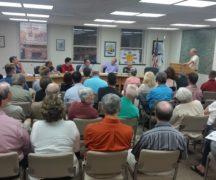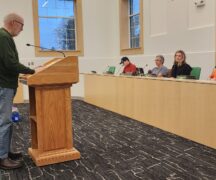By JAN LARSON McLAUGHLIN
BG Independent News
The city charter isn’t exactly riveting reading – but some changes being discussed might grab the attention of city residents.
No decisions have been made, and citizens will have a chance to vote on any proposed changes to the charter. But here are a few of the revisions under discussion:
- Make all council terms four years. Currently, the ward candidates serve two years and the at-large serve four.
- Change council races to non-partisan. Currently, candidates must declare a party such as Democratic, Republican, Green, Libertarian or Independent.
- Make all council seats at-large. Currently, one candidate is elected from each of the four wards, and three are elected to serve at-large.
- Change the filing date to August, as is done by most area communities.
- Possibly change the ward reapportionments, based on population but keeping neighborhoods intact.
The citizen committee working on the Bowling Green City Charter review discussed nearly 20 possible changes to the charter during a public meeting last week. The group members are keenly aware that they must decide not only if the changes belong in the charter – but also if city voters are likely to support the proposals.
“There will be a lot of things for the voters to be dealing with” on the November ballot, said Shannon Orr, co-chair of the charter review commission with Jeff Crawford.
The commission doesn’t want to overburden voters, but the charter requires that any changes be approved during a general election.
Some of the changes would affect the structure of City Council.
One would make all the council seats at-large, instead of some of them representing wards. All the seats would have four-year terms.
Mark Hollenbaugh was strongly opposed to this change, explaining that all three of the at-large seats on council right now are filled by residents of the Fourth Ward.
“I’m afraid if we make all the council seats at-large, it could end up no one on the East Side of town is on council,” Hollenbaugh said.
Julie Broadwell agreed.
“I think it’s critical for the East Side that Wards 1 and 2 have representatives,” she said.
Les Barber said such a change would discriminate against college students and other East Side residents.
Gary Hess agreed the ward representatives should remain.
“Every resident of Bowling Green has a council person in the area he or she lives,” Hess said.
Others suggested the city is not big enough to require ward representatives, and asked if the current system created an “us versus them” mentality. It was also noted by City Attorney Mike Marsh that it may take just 200 voters to elect a council member in the First Ward, while it could take 2,000 voters in the Fourth Ward.
But those commission members from the East Side stood strong that they deserve representation by someone living in their neighborhoods.
“They can’t relate because they don’t have people urinating on their porch on Friday nights,” Hollenbaugh said of other ward council members.
“If they don’t live there, they are not going to truly understand what the issues are,” Barber said.
Another change could create non-partisan council positions. That would mean the top vote getters would be elected, with no party primaries.
Currently in the region, only Toledo and Bowling Green have partisan council races, Marsh said.
“It’s more of a model you see with larger cities,” Marsh said.
That change could make it easier to find council candidates, if they don’t wish to declare a political party, he said.
If that were to happen, the city could moves its council filing deadline to August, which would put it on the same schedule as other communities and which would be more student-friendly.
Ward reapportionment is also being considered. In the past, the city divided up its wards based on registered voters. However, the courts ordered that wards must be based on population.
Currently two residence halls on the BGSU campus are part of the Third Ward. Hollenbaugh said the goals of reapportionment would be to ensure that the city didn’t end up with “screwy gerrymandering wards.”
Marsh explained that the framers of the city charter wanted it to address areas where the city deviated from the Ohio Revised Code.
Following are some other charter changes being considered:
- Council vacancies. Currently, a council replacement stays in office the balance of the unexpired term. That means someone appointed to the position could potentially stay in the seat for nearly four years. That may be changed so the position goes on the ballot sooner.
- Publication of ordinances and resolutions. The change would add “online” publications, and might take out the requirement that they be published in printed newspapers.
- City administrator residence. Currently, the municipal administrator can be hired from outside Bowling Green, but must move to the city. The change would have allowed them to live outside the city. “I really don’t think we should advance something we know will get voted down,” Hollenbaugh said.
- Creation of departments. It was suggested that the planning office be added to the list of city departments. “The planning issue is a very vital issue for the city,” Barber said.
- Civil service commission. Currently, the city considers the top three candidates for civil service positions. It was suggested that number be expanded to five, since sometimes the best candidates don’t score among the highest, and it would allow for more candidates to be interviewed for positions such as police and fire chiefs.
- Veterans’ credit. Currently, a job candidate automatically gets a 20 percent credit for being a veteran. It was suggested that be changed to 10 percent. “I support veterans. I think veterans make great employees,” John Fawcett said. An Army veteran himself, Fawcett said he supported the change.
- Planning commission. The current language states the planning commission should have “at least” seven members. The change would limit the commission to seven. It was decided, however, that this change could be made by council rather than adding another charter item for voters to decide.
- Charter review. It was suggested that a time limit be put on the process, such as every 10 years. However, several commission members said there should be no exact number.
- Meetings open to the public. The current charter states that city meetings are open to the public except for those dealing with issues of misconduct. However, the state has since enacted the Sunshine Law, which the city must follow.
- Gender pronouns. It seemed to be agreed upon that the charter’s pronouns should be updated. But rather than putting each section of the charter on the ballot, it was decided that the update could be an administrative fix.
- Public Utilities. The proposed change would allow non-residents to serve on the board of public utilities, since utilities are sold to entities outside the city. “It would invite issues with other wholesale customers,” Marsh said. And others agreed it would likely be booted by voters.
- Non-discrimination article. Some suggested a non-discrimination statement should be added to the preamble.
The next meeting of the charter review commission will be April 26.





